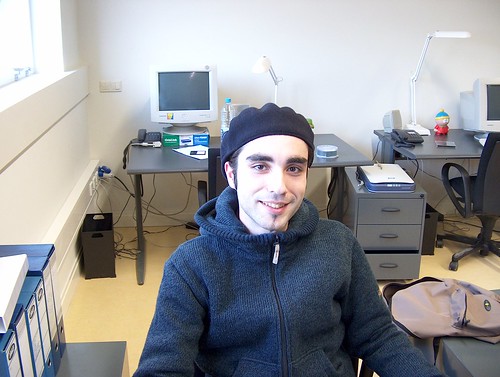
There are plenty of books and articles on the Web talking about the fears and uncertainties that PhD students face, usually offering some advice and outlining what the big picture objectives. But as a PhD candidate myself, what can I tell to other PhD students? Any good advice? Well, if I had to select 10 really important things that I learned along these last years, and that can be relevant to other PhD students, I would go for the following list:
1 - Learn to write. Communicating the results of your research is one of the most important aspects of your work, and you'll be doing this by publishing papers on conferences and journals. There's nothing worse than a really cool idea that isn't properly presented, so please learn present your ideas in written.
The book "Writing for Computer Science" by Justin Zobel is a great resource that can help you in learning how to write papers and reports. Also learn to
master the English language, as it is clearly the lingua franca for science. Most experts in your area will speak English and this way they will be able to read your work. You'll also be wanting to publish in the top international journals and conferences, and they usually require English texts.
2 - Know your stuff, and be prepared to read a lot... And not just stuff directly relevant to your research, but other things as well. If your school has the habit regularly inviting people to give seminars, then please attend them. You'll not only see be exposed to some new ideas, but you'll also be learning how to properly present your own thoughts. There's also lots of information on the Web so there's really no need to spend lots of money on books. For instance
Wikipedia is great to start you in some new subject, and I'm myself quite amazed at how much information you can find there on specific subjects such as
algorithms and computer theory. And you can also try
MIT World (or
MIT OpenCourseWare) for free lectures. And don't miss
LSE,
CMU, and
Connexions. Still want more? Well, don't forget
ResearchChannel,
Vega, and
Wikiversity. Plenty of information on
psychology,
biology,
geology,
math, or
computer science. Or instead of lectures, maybe you prefer
journals,
papers,
textbooks, or even
podcasts. As you can see, there's no excuse for shortage of free information.
3 - Keep notes. Anything will do, a blog, a moleskine or your good old e-mail account. Despite fancy things like Google calendar, sending emails to myself is usual what works best for me. And aside the supporting tools, keeping notes is important for several reasons : (a) writing helps your thoughts to crystallize (b) you register the fact that you accomplish your daily tasks, which will make you feel good (c) you can track your progress (d) when you are finally preparing your thesis, you'll have written material to draw on (e) you won't forget what you were thinking two weeks ago. Most students start too late in putting their thoughts into words... Don't make that mistake.
4 - Learn to use LaTeX, a computer program to help typeset documents with formulas, algorithms and mathematical symbols. Trust me, you won't regret this. You're probably used to Windows Word or some other WISIWIG text editing tool, but with LaTeX you'll be focusing on what you want so say, rather than on how the document is formatted. The learning curve associated with using LaTeX is a little steep, but after a while you'll never want to go back to Word. There's also a LaTeX tool called
beamer for generating presentation slides, but PowerPoint still works better for me.
5 - Learn to use The R System for Statistics. In short, R is an open-source free version of the
SPSS statistics package. It integrates nicelly with LaTeX, other UNIX tools, or even with programing languages such as
Python or Java. At some point in your work, you're gonna have to make some statistical analysis of your results, and quite probably you'll find that Excel is just not enough. Learning R is one of the best things I did in the last year, and I'm now able to do statistical tests or plot ROC curves with just a few lines of code.
6 - Learn to account for the fact that making a thesis always takes longer than you plan. And this rule goes for everything, you just have to learn to live with this. For instance, if you have a deadline for submitting a paper, you should plan in advance to have everything ready something like three weeks before the deadline.
7 - Disseminate your "sub-results" to others (If you're studying computer science, this should read "release open source software"). Publishing papers is great, but you should also share the actual stuff that you produced your results with. If you have a great set of testing data, than please put it on the Web, as other students will surely benefit from this. You'll also get extra feedback on your stuff, and comments than can actually make a difference in improving your work. Beware though, this can often lead you to spending too much time with stuff that is not directly relevant to your research. Be reasonable about this and learn how to compromise. Release your stuff, but don't volunteer to fix every little problem that other people complain about.
8 - Get the most out of the relationship with your research adviser. Besides staying at his desk thinking "it's good to be the king", your adviser also has much more experience than you, and you should listen to everything he has to say. He's probably busy, so learn to plan meetings. Also prepare to make contact with other researchers in your area. The more people giving you advise, the better for you.
9 - Publish, publish, publish. Did I say this already? Don’t be afraid of rejection; you’ll live!! And when your paper is rejected, treat all the ignorant remarks from the stupid referees as indications that you did not write clearly enough that even they would get your point. Go for journals, not conferences, to publish your results. Journals are a lot easier and are usually also more prestigious. Conferences are very hard, because the committee has to reject 80% of the submissions by a short deadline. the slightest problem with the paper leads to its rejection. In a journal, the same problem would lead to the referee saying, “Accept the paper pending certain revisions.”
10 - Enjoy your "play time". Yup, this is my favorite rule! There is a time to work and a time to play. I try to work hard when I work, and not to think at all about work when I don't work. When you have worked hard all week and can afford to take the week-end off, try to get out and do something fun. Try not to think about work at all. Believe me, this is going to be one of the most difficult rules to follow, but your sanity and mental health will depend on it.



 There are plenty of books and articles on the Web talking about the fears and uncertainties that PhD students face, usually offering some advice and outlining what the big picture objectives. But as a PhD candidate myself, what can I tell to other PhD students? Any good advice? Well, if I had to select 10 really important things that I learned along these last years, and that can be relevant to other PhD students, I would go for the following list:
There are plenty of books and articles on the Web talking about the fears and uncertainties that PhD students face, usually offering some advice and outlining what the big picture objectives. But as a PhD candidate myself, what can I tell to other PhD students? Any good advice? Well, if I had to select 10 really important things that I learned along these last years, and that can be relevant to other PhD students, I would go for the following list:

